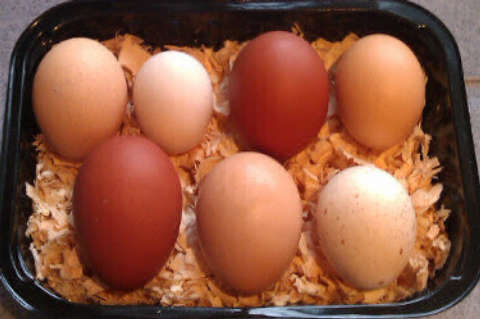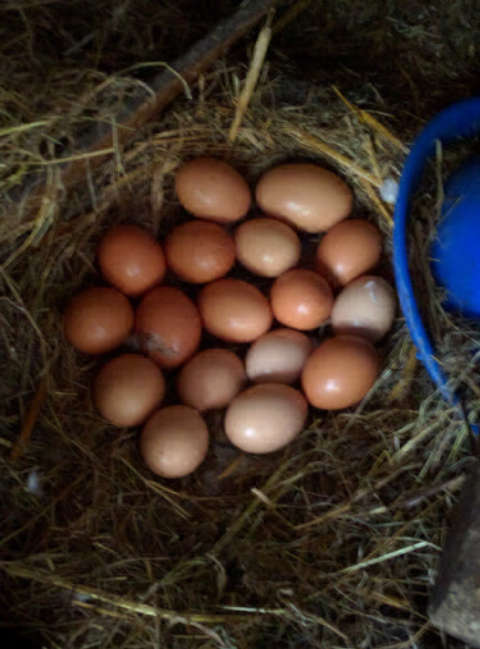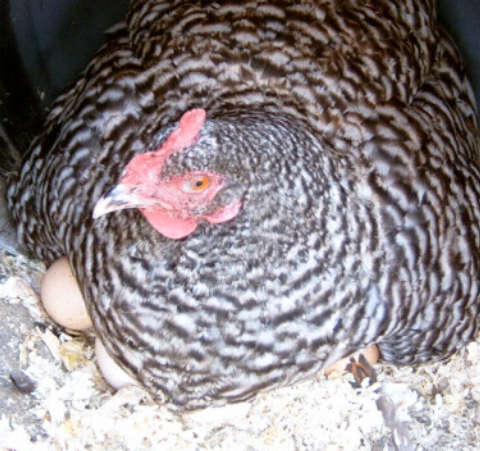Do the hens mind you take their eggs?

Chickens do not mind when you take their eggs from the nest. All chicken behaviours like roosting and scratching are instinctive and nesting is no exception. I have even been able to take my eggs directly from underneath the hens although this is not always the case. Once an egg is laid the hen will leave the nest and continue with her day.
Will you chickens be upset if take their eggs?
No, for the most part your hens will not care when you take their eggs. When you have had them a while and they are tame and used to you even slipping a hand underneath them and plucking the egg from under a hen won't bother them.
Yes if they are broody you may have a fight on your hands. See the video below for a bad tempered broody hen.
Below: Finding a hidden nest of eggs. Chickens hide nest instinctively, not because you are taking the eggs away.
If you are worried about the egg collection process there are special inserts you can get for the nests that make the eggs roll away from the hen into a collecting tray as soon as they are laid. They are actually made to stop egg eating behaviour but they work equally well in this situation.
Only broody hens are protective of their eggs.
Do chickens care about or miss their eggs?
I am able to slip my hands under most of my hens while they are sat in the nest laying eggs without any bother.
No. Chickens don't seem to remember their eggs are in the nest and go back looking for them. Nor do they care if you take them. And they wont get mad at you for collecting their eggs unless they are broody, then you need to watch your fingers!
In the wild a hen would lay a clutch of 12 to 14 and then begin to sit on them. Modern hybrid laying hens have been bred to try to eliminate the urge to brood, which means that a hen won’t usually try to incubate her eggs by sitting on the nest to hatch them.
This is something humans have done to ensure that we don’t have to fight our hens to get their eggs and it isn't always successful, I have a few hybrids that have raised chicks over the years without an issue.
Below: Eggs from my hens.

That being said, there are some strains more prone to broodiness than others, which is why it's important to research the type of hens you’ll be getting for your backyard and what their breed is prone to.
When a hen becomes broody, she most definitely will be upset with you for taking her eggs. In fact, she will sit on the nest all day and refuse to let you anywhere close to her.
If you do, she will hiss and grumble at you and even peck you. For the most part it is limited to grumbling, squawking and bad tempered flapping about but there are exceptions. I have had broodies fly up at my face and draw blood from my hands and arms so a little care is advised.
Below: A bad tempered broody hen will object to you taking her eggs.
Raised hackles and general complaining followed by a few grabs with the beak will let you know she is broody.
A broody hen doesn’t need a rooster around to try to hatch eggs. She may sit on anything in a nest, from a golf ball to a rock, in a misguided attempt to hatch it.
If you do have a rooster and are trying to expand your flock, this works out great! Broody hens are in mothering mode and will incubate, hatch, and care for her baby chicks. However, if you don’t have a rooster in sight and have no interest in adding more chicks to your flock, you’ll want to take steps to break your hen out of her broody behaviour.
Some farmers choose to add “decoy” eggs to the nesting boxes, so as not to disturb the hens when they remove the eggs. While others suggest this to avoid encouraging broodiness. You can use pottery eggs or smooth round stones from a river bed.
Below: A hidden nest of eggs.

Free range hens will often hide a nest leading to the belief they do not want their eggs removing. This is merely instinctive behaviour to make a well hidden nest which they would need for their survival in the wild. If you keep taking the eggs the hen will keep laying.
Chickens will often share nesting boxes, especially those made to be particularly attractive.
A nesting box that is elevated with good air circulation, deep straw, and free from critters, will draw even free-range hens back to the coop to lay. Otherwise, you will have to go hunting for your eggs. This can be a fun activity but can become time-consuming if your girls are constantly switching their preferred laying spots.
While chickens are good at learning routines, recognising people, and have complex social systems, they aren’t blessed with much in the way of problem-solving or reasoning skills, so they often won’t recognise that you’re the one taking their eggs.
Below: A Barred Rock hen laying in a communal nest with several other eggs in.

One important thing to note is that some chickens don’t want you taking their eggs while they’re still in the nesting box as they don't like being disturbed.
Hens prefer privacy and stillness when going about the business of laying her eggs. A hen may get upset or will not lay her eggs there again if she is disturbed while laying since she will no longer see the nest as a safe place. So when your hen is actively laying eggs, you’ll want to leave her be until she’s come out of her accord—clucking and rejoining the flock.
To discourage broodiness, keep a strict schedule for picking up eggs. Making sure that you’re not leaving down lots of eggs will help prevent the hens from feeling the instinctual drive to hatch a brood of eggs.
Find time to pick up eggs before nightfall each day, even if your free-range hens make you hunt for them. This will not only prevent broodiness but will also make it less likely that you will draw in predators—we’re not the only ones who think chicken eggs are a tasty snack—and will make sure that you are collecting the freshest eggs each day.
